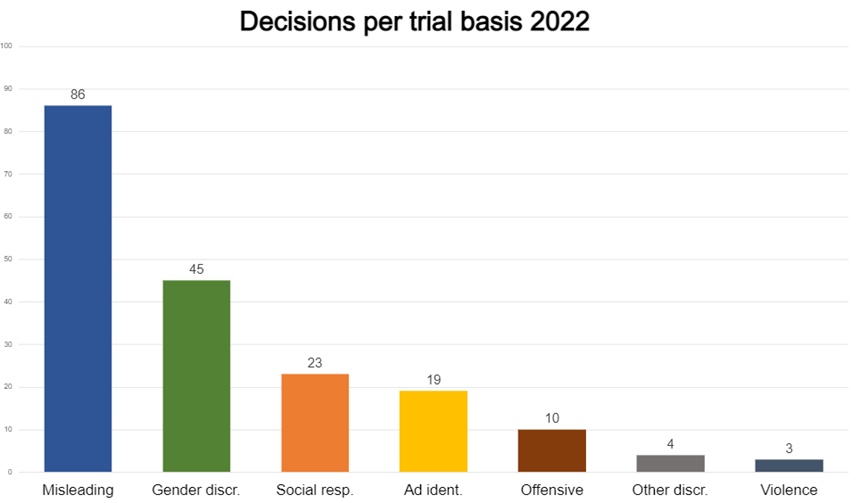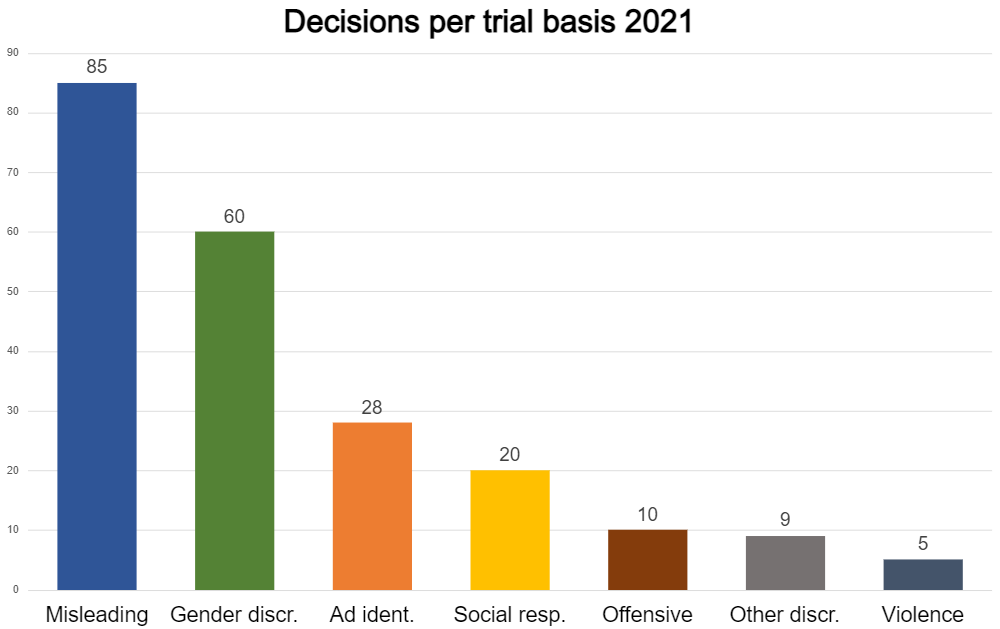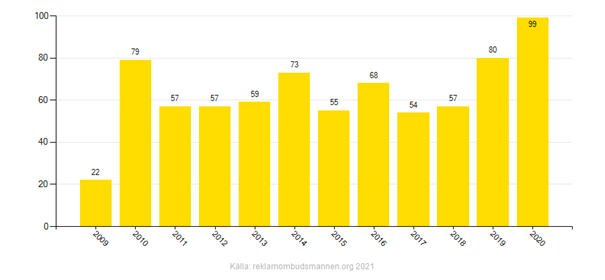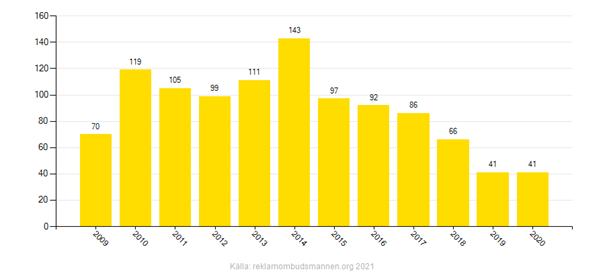Statistics
See below for information about complaints and decisions from previous years. For information about years before 2017, please contact [email protected].
Summary year 2022
In 2022, RO received 617 complaints, a decrease of 7 % compared to the previous year. In total, RO and RON (the Jury) announced 185 decisions during the year, which is a decrease of 13 % compared to 2021.
The proportion of ads judged to be in breach of the ICC code was 75 % (139), an increase of 6 %. Almost half of the decisions are about misleading advertising, such as environmental claims, price claims and sale offers in retail, the food industry and the beauty and health industry.
Number of complaints and cases
RO received 617 complaints during 2022, a decrease of 7 % compared to the previous year. The complaints resulted in 246 cases.
There may be several complaints in one case if they relate to the same advertising. In each case a decision is given. Complaints can be upheld, not upheld, or rejected. All decisions of upheld or not upheld complaints were published on the website reklamombudsmannen.org, and also rejected cases decided by RON (the Jury) were published. More than half of the cases, 60 %, were handled within two months. Almost 90 % were handled within three months.
Rejected complaints
During the year 297 complaints were rejected. A complaint can be rejected, for example, if the communication complained about is not commercial, is not primarily aimed at the Swedish market or if the complaint is not submitted sufficiently. As the year 2022 was an election year, many of the rejected complaints concerned political advertising, something that RO does not handle as it is protected by the Swedish Freedom of the Press Ordinance and the Freedom of speech Act.
Most common causes for complaints
Misleading advertising: Misleading advertising was the most common cause of complaints, with 87 complaints leading to 86 decisions, of which 87 % were upheld (75 decisions). Complaints about misleading advertising were mainly about price claims, sale offers and environmental claims in retail, the food industry and the beauty and health industry.
Eleven decisions dealt with misleading environmental claims, of which ten were upheld. The previous year ten decisions dealt with misleading environmental claims, nine were upheld.
Gender discriminating advertising: Complaints against gender discriminating advertising decreased by 40 % compared to the previous year (53 complaints compared to 86 complaints). This led to a 27 % decrease in the number of decisions (45 decisions). Of these decisions more than half of the assessed ads where upheld, 61 % (27 decisions).
Ad identification: The number of complaints regarding ad identification has also decreased compared to the previous year, 20 complaints led to 19 decisions, compared to 29 complaints and 28 decisions. As much as 84 % of these ads were found to be in breach of the ICC Code (16 decisions). Complaints about ad identification is mainly about transparency of advertising on Instagram.

Most complained about ads
ICA commercial, 42 complaints, upheld.
Sambla commercial, 13 complaints, upheld.
Summary of 2021
In 2021, RO received 660 complaints, a decrease of 4 % compared to the previous year. In total 212 decisions where announced during the year, which is an increase of 8 % compared to 2020. The percentage of assessed ads that are in breach of the ICC code is 70 % (147 decisions), an increase of 7 %.
Misleading advertising was the most common basis for complaints during the year with 85 decisions. Of those decisions 87 % (74 decisions) was regarding advertising that was in breach of the ICC code. Complaints about misleading advertising is mainly about price claims, sale offers and environmental claims in retail, the food industry and the beauty and health industry.
Complaints against gender discriminating advertising increased and the decisions increased with 40 % compared to the previous year (60 decisions). In 54 % of those cases the complaint was upheld (33 decisions). Complaints about gender discriminating advertising is mainly about digital advertising for clothes and beauty products.
There was also a significant increase of complaints regarding ad identification, which led to 28 decisions, compared to 11 decisions the previous year. In 93 % of those cases the advertising was found to be in breach of the ICC code. Complaints about ad identification is mainly about transparency of advertising on Instagram.

Number of complaints and cases
RO received 660 complaints during 2021, a decrease of 4 % compared to the previous year. The complaints resulted in 283 cases.
There may be several complaints in the same case if they relate to the same advertising. In each case a decision is given. Complaints can be upheld, not upheld or rejected. All decisions of upheld or not upheld complaints were published on the website reklamombudsmannen.org, and also important rejected cases made by RON (the Jury).
During the year 212 decisions was made by RO and RON, an increase of 8 % compared to the previous year. Among these, the complaint was:
• upheld in 147 cases,
• not upheld in 61 cases,
• And four cases where rejected by RON.
More than half of the cases, 56 %, is handled within two months.
Rejected complaints
During the year 330 complaints were rejected. A complaint can for example be rejected if the communication complained about is not commercial, is not primarily aimed at the Swedish market or if the complaint is not submitted sufficiently.
Most common causes for complaints
Misleading advertising: For the third year in a row, misleading advertising was the most common cause for complaints. A total of 99 complaints led to 85 decisions. 87 % of them were upheld. Complaints about misleading advertising is mainly about price claims, sale offers and environmental claims in retail, the food industry and the beauty and health industry.
Ten decisions was about misleading environmental claims, of which nine where upheld. The previous year 12 decisions was about misleading environmental claims, all upheld.
Gender discriminating advertising: Complaints against gender discriminating advertising increased compared to the previous year, 87 complaints compared to 53 complaints. This led to a 40 % increase in the number of decisions regarding gender discriminating advertising (60 decisions). Of those decisions more than half, 54 %, were upheld.
Ad identification: There was a significant increase in the number of complaints regarding ad identification, 29 complaints led to 28 decisions, compared to 11 decisions the previous year. As much as 93 % of the decisions regarding ad identification was upheld (26 decisions). Complaints about ad identification was mainly about transparency of advertising on Instagram.
Most complained about ads
Bilfärg.se 8 complaints, upheld.
Alvedon 7 complaints, upheld.
Ford 6 complaints, upheld.
Summarizing 2020
In 2020, RO received 686 complaints, an increase of 12% compared to the previous year. In total, RO and RON announced 191 decisions during the year, which is a decrease of 7% compared to 2019. The percentage of assessed ads that are in breach of the ICC code is 64%.
Misleading advertising was the most common basis for complaints during the year. The number of decisions concerning misleading advertising is the highest in the history of the Advertising Ombudsman, 99 decisions. Of these 82 % was upheld.
Number of complaints and cases
In 2020, the Advertising Ombudsman received a total of 686 complaints, an increase of 12% on the previous year (613). The complaints resulted in 297 cases. There may be several complaints in the same case if they relate to the same advertising. In each case, a decision is given. Complaints can be upheld, not upheld or rejected. All decisions of upheld or not upheld complaints were published on the website reklamombudsmannen.org, and also important rejected cases made by RON (the Jury).
191 decisions was made by RO and RON during the year. In these, the complaint was:
- upheld in 122;
- not upheld in 64;
- rejected in 5.
Rejected cases
- During 2020 a total of 92 cases were rejected as considered being without merit, 5 of these were published on the website as being of special importance.
- A complaint can be rejected, for example, if the communication is not commercial, is not primarily aimed at the Swedish market or if the complaint is not submitted sufficiently.
Most common cause for complaints
- Misleading advertising was the most common cause for complaints with 99 decisions of which 81 was upheld.
- Gender discrimination was the second most common cause for complaints with 41 decisions; 22 upheld. The number of cases relating to gender-discriminatory advertising has more than halved in the last five years.
- Complaints about social responsibility led to 21 decisions; 7 upheld.
Decisions regarding misleading advertising, 2009–2020

Decisions regarding gender discrimination in advertising, 2009-2020

Most complaint about - top three
- Outdoor ad for Peas of heaven, 25 complaints, upheld*
- Tv-commercial for Nutrilett, 14 complaints, upheld
- Outdoor ad for Hedvig, 5 complaints, upheld
*The decision was made in 2021 but the complaints where received in 2020.
Summarizing 2019
- RO and RON announced 205 decisions during the year where 56 percent were upheld. The previous year the percentage was 46.
- The total number of complaints increased by 17 percent compared to 2018, and the total number of decisions increased by 15 percent.
- Complaints concerning misleading advertising increased with 20 percent and was therefore for the first time the most common cause of complaints. During the year 80 decisions regarding misleading advertising was made, and 56 of these where upheld.
- The number of decisions against gender discriminating advertising has was the lowest in ten years (41 decisions of which 21 was upheld).
Number of complaints and cases
During 2019 RO received 613 complaints, of which resulted in 279 cases. In each case a decision was made. Several complaints may lead to one case. Complaints can be upheld, not upheld or rejected. All decisions of upheld or not upheld were published on the website reklamombudsmannen.org.
205 decisions was made by RO and RON during the year. In these, the complaint was:
- upheld in 115;
- not upheld in 79;
- rejected in 11.
Rejected cases
- During 2019 a total of 115 cases were rejected as considered being without merit, 11 of these were published on the website as being of special importance.
- A complaint may be rejected if the announcement is not considered commercial, is not mainly aimed at the Swedish market, or if the complaint is insufficiently filed.
Most common cause
- Misleading advertising was the most common cause for complaints with 37 percent of the decisions, that is 80 decisions of which 56 was upheld.
- Gender discrimination was the second most common cause for complaints with 41 decisions; 21 upheld.
- Complaints about ad identification led to 34 decisions; 24 upheld.
Top three
- Commercial for the gaming website Tombola, 19 complaints, upheld.
- Commercial for the dairy company Arla, 19 complaints, rejected (to be assessed by the Swedish Consumer Agency).
- Commercial for the gaming website Tombola, 10 complaints, upheld.
Summarizing 2018
- RO and RON announced 178 decisions during the year where 48 percent were upheld. The previous year the percentage was 50.
- The total number of complaints decreased by 11 percent compared to 2017, and the total number of decisions decreased by 24 percent. The total number of complaints regarding gender discriminatory advertising decreased by 49 percent.
- Complaints concerning ad identification, specifically complaints against influencers content on social media, decreased in 2018. During the year RO and RON made 12 decisions regarding ad identification, compared with 41 decisions the year before.
Number of complaints and cases
During 2018 RO received 522 complaints, of which resulted in 231 cases. In each case a decision was made. Several complaints may lead to one case. Complaints can be upheld, not upheld or rejected. All decisions of upheld or not upheld were published on the website reklamombudsmannen.org.
Out of the 178 decisions made by RO and RON during the year, the complaint was
- upheld in 86;
- not upheld in 85;
- rejected in 7.
Rejected cases
- During 2018 a total of 50 cases were rejected as considered being without merit, 7 of these were published on the website as being of special importance.
- A complaint may be rejected if the announcement is not considered commercial, is not mainly aimed at the Swedish market, or if the complaint is insufficiently filed.
Most common cause
- Gender discrimination was the most common cause for complaints with 37 percent of decisions (80 decisions, 56 upheld).
- Misleading advertising was the second most common cause for complaints with 32 percent of decisions (57 decisions; 35 upheld).
- 9 percent of decisions were regarding offensive advertising and/or social responsibility (16 decisions respectively).
Top three
- Ads for the cheese Apetina Paneer, 16 complaints, not upheld.
- Job listing from Bahnhof,15 complaints, upheld.
- Tiara Shop and an Instagram posting about a vegan salad from Katrin Zytomierska Clean Eating, 6 complaints respectively, upheld.
Summarizing 2017
- RO and RON announced 230 decisions during 2017 where 50 percent were upheld. In 2016 the percentage was 49.
- The total number of complaints increased by 15 percent compared to 2016, and the total number of decisions increased by 6 percent. The number of complaints regarding gender discriminatory advertising decreased by 17 percent.
- Complaints concerning ad identification, specifically complaints against influencers content on social media, increased in 2017. During the year RO received 46 complaints compared to 20 complaints in 2016.
Number of complaints and cases
During the year RO received 588 complaints, of which resulted in 279 cases. In each case a decision was made. Several complaints may lead to one case. Complaints can be upheld, not upheld or rejected. All decisions of uphled or not upheld were published on the website reklamombudsmannen.org.
Out of the 230 decisions made by RO and RON during 2017, the complaint was
- upheld in 116,
- not upheld in 107,
- rejected in 7.
Rejected cases
- During 2017 a total of 47 cases were rejected.
- A complaint may be rejected if the announcement is not concidered commercial, is not mainly aimed at the Swedish market, or if the complaint is insufficiently filed.
Most common cause
- Gender discriminating was the most common cause of complaints with 37 percent of decisions (86).
- Misleading advertising was the second most common cause of complaints with 23 percent of decisions (54).
- Ad indentification was the third most common cause with 18 percent of decisions (41).
- The number of complaints regarding gender discriminatory advertising decreased by 17 percent compared to 2016, with 134 complaints 2017. In 2016 the number was 162.
Top three
- Ad campaign for Mifú, 66 complaints, upheld.
- Advertisement for a jacket from Thernlunds, 11 complaints, upheld.
- Commercials for Pricerunner, 8 complaints, upheld.
